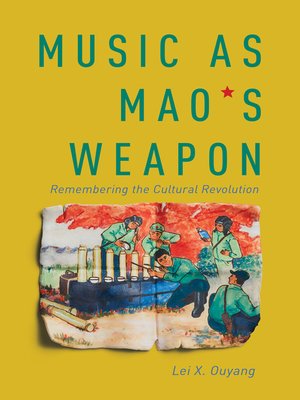
Sign up to save your library
With an OverDrive account, you can save your favorite libraries for at-a-glance information about availability. Find out more about OverDrive accounts.
Find this title in Libby, the library reading app by OverDrive.



Search for a digital library with this title
Title found at these libraries:
| Library Name | Distance |
|---|---|
| Loading... |
China's Cultural Revolution (1966-1976) produced propaganda music that still stirs unease and, at times, evokes nostalgia. Lei X. Ouyang uses selections from revolutionary songbooks to untangle the complex interactions between memory, trauma, and generational imprinting among those who survived the period of extremes. Interviews combine with ethnographic fieldwork and surveys to explore both the Cultural Revolution's effect on those who lived through it as children and contemporary remembrance of the music created to serve the Maoist regime. As Ouyang shows, the weaponization of music served an ideological revolution but also revolutionized the senses. She examines essential questions raised by this phenomenon, including: What did the revolutionization look, sound, and feel like? What does it take for individuals and groups to engage with such music? And what is the impact of such an experience over time?
Perceptive and provocative, Music as Mao's Weapon is an insightful look at the exploitation and manipulation of the arts under authoritarianism.
|List of Illustrations ixAcknowledgments xiii
Notes on Pinyin, Surnames, Transliteration, and Translation xvii
1 Researching the Battlefield 1
2 Music and Politics 23
Memories of the Battlefield: "It's in Your Bones, It's in Your Blood" 71
3 Music and Childhood 76
Memories of the Battlefield: "Learning Music to Avoid Going 'Up to the Mountains and Down to the Countryside'" 103
4 Music and Memory 109
Memories of the Battlefield: "You Hear These Songs and You Are Inspired" 131
5 Conclusions 138
Appendix A Brief Historical Context of the Cultural Revolution 155
Appendix B Sixty-Five Children's Songs in New Songs of the Battlefield 159
Chinese Character Glossary 163
Notes 169
Bibliography 177
Index 191|"This book opens a new window to events during the Mao era; it undermines our preconceived bias about the events of that phase and is full of musical pieces of the period, providing a distinct picture of the society at that time. . . . Scholars trying to understand Chinese culture and East Asian Studies should go through this book, as the multidisciplinary approach of Lei would lead them to explore something new and fresh in the field." —International Institute for Asian Studies
"Music as Mao's Weapon is well-written and comes with detailed background information, photographs, music examples and song lists, which makes it attractive also to the non-China expert. It exposes strategies of revolutionary music composition and investigates its effects on the individual in the highly politicized and violent context of the Cultural Revolution. . . . Ouyang's book offers stimulating insight into why, how, and to whom this musical heritage is still meaningful today." —The China Quarterly
"Highly recommended." —Choice
|Lei X. Ouyang is an associate professor of music at Swarthmore College.







